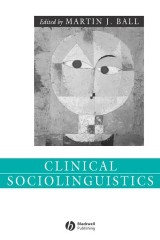Details

Clinical Sociolinguistics
Language in Society, Band 15 1. Aufl.
|
114,99 € |
|
| Verlag: | Wiley-Blackwell |
| Format: | |
| Veröffentl.: | 15.04.2008 |
| ISBN/EAN: | 9781405141383 |
| Sprache: | englisch |
| Anzahl Seiten: | 360 |
DRM-geschütztes eBook, Sie benötigen z.B. Adobe Digital Editions und eine Adobe ID zum Lesen.
Beschreibungen
<i>Clinical Sociolinguistics</i> examines how sociolinguistic research paradigms can be applied to assessment, diagnosis and treatment in the clinical situation. <br /> <ul class="noindent"> <li>fills gap in the literature for speech-language pathologists by addressing how sociolinguistic research paradigms can be applied to assessment, diagnosis and treatment in the clinical situation<br /> </li> <li>collects newly commissioned articles written by top scholars in the field<br /> </li> <li>includes chapters that outline findings from sociolinguistic research over the last 40 years and point to the relevance of such findings for practicing speech-language pathologists<br /> </li> <li>discusses topics including bilingualism, code-switching, language planning, and African-American English</li> </ul>
Notes on Contributors. <p>Foreword.</p> <p>Loraine Obler.</p> <p>Preface.</p> <p>Part 1: Sociolinguistic Research:.</p> <p>1. Language, communities, networks and practices: David Britain (Essex University) & Kaz Matsumoto(University of Tokyo, Japan).</p> <p>2. Regional and social variation: Margaret Maclagan (University of Canterbury, New Zealand).</p> <p>3. Language and gender: Jackie Guendouzi (University of South Alabama).</p> <p>4. Bilingualism and multilingualism: John Edwards (St. Francis Xavier University).</p> <p>5. Code-switching and Diglossia: Nicole Müller and Martin J. Ball (both University of Louisiana, Lafayette).</p> <p>6. Language and Power: Jack Damico (University of Louisiana, Lafayette), Nina Simmons-Mackie (Louisiana University), and Holly Hawley (University of Louisiana, Lafayette).</p> <p>7. Language and Culture: Nicole Taylor and Norma Mendoza-Denton (both University of Arizona).</p> <p>8. African-American English: Walt Wolfram (North Carolina State University).</p> <p>9. Language Change: Dominic Watt (University of Aberdeen, Scotland) and Jennifer Smith (University of York).</p> <p>10. Language Planning: Humphrey Tonkin (University of Hartford).</p> <p>11. Dialect perception and attitudes to variation: Dennis Preston and Gregory C. Robinson (both Michigan State University).</p> <p>Part 2: A Clinical Sociolinguistics:.</p> <p>12. Acquisition of sociolinguistic variation: Julie Roberts (University of Vermont).</p> <p>13. Bi- and multilingual language acquisition: Zhu Hua and Li Wei (both University of Newcastle).</p> <p>14. Assessing Language in Children who Speak a Nonmainstream Dialect of English: Janna Oetting (Louisiana State University).</p> <p>15. Childhood Bilingualism: distinguishing difference from disorder: Li Wei, Nik Miller, Barbara Dodd and Zhu Hua (all University of Newcastle).</p> <p>16. Speech Perception, Hearing Impairment, and Linguistic Variation: Cynthia Clopper & David Pisoni (both Indiana University).</p> <p>17. Aphasia in multilingual populations: Martin Gitterman (City University of New York).</p> <p>18. Designing assessment materials for multilinguals: Janet Patterson and Barbara Rodríguez (both University of New Mexico).</p> <p>19. Literacy as a sociolinguistic process for Clinical Purposes: Jack Damico (University of Louisiana, Lafayette), Ryan Nelson (University of Texas, El Paso), and Linda Bryan (University of Louisiana, Monroe).</p> <p>20. The Sociolinguistics of sign languages: Ceil Lucas (Gallaudet University), Robert Bayley (University of Texas, San Antonio), and Arlene Blumenthal Kelly (Gallaudet University).</p> <p>21. Managing linguistic diversity in the clinic: interpreters in speech-language pathology: Kim Isaac (University of Newcastle, Australia).</p> <p>References.</p> <p>Name Index.</p> <p>Subject Index.</p>
“Individuals acquire language, and lose it, in a variety of contexts. Gender, geography, socioeconomic status and bilingualism are all relevant to clinical reasoning about speech and language disorders. This timely volume is grounded in state-of-the art sociolinguistic research, but also demonstrates the application of sociolinguistic thinking to the clinical situation. It will be an invaluable text for those professionals faced with linguistically and culturally diverse client groups, and for students and researchers in communication disorders.” <i>Paul Fletcher, University College Cork</i>
<b>Martin J. Ball</b> is Hawthorne/Board of Regents Endowed Professor and Head of the Department of Communicative Disorders at the University of Louisiana at Lafayette. He is President of the International Clinical Phonetics and Linguistics Association, and editor of the journal <i>Clinical Linguistics and Phonetics. </i>His publications include <i>Vowel Disorders</i> (co-edited with Fiona Gibbon, 2002) and <i>Methods in Clinical Phonetics </i>(with Orla Lowry, 2001).
Sociolinguistics, the study of the interaction of language and society, has had a major impact on linguistics for the last half-century. However, this prominent branch of the language sciences has had little contact with the field of communication disorders. <i>Clinical Sociolinguistics</i>, a collection of newly commissioned articles written by top scholars, is a major advance in bringing the two fields together.<br /> <p><br /> </p> <p>Part I includes chapters that outline findings from sociolinguistic research and point to the relevance of such findings for practicing speech-language pathologists. Topics discussed include bilingualism, code-switching, language planning, and a detailed look at African American English. Part II contains chapters that specifically demonstrate how these research paradigms can be applied to assessment, diagnosis, and treatment in the clinical situation.<br /> </p>
“Individuals acquire language, and lose it, in a variety of contexts. Gender, geography, socioeconomic status and bilingualism are all relevant to clinical reasoning about speech and language disorders. This timely volume is grounded in state-of-the art sociolinguistic research, but also demonstrates the application of sociolinguistic thinking to the clinical situation. It will be an invaluable text for those professionals faced with linguistically and culturally diverse client groups, and for students and researchers in communication disorders.” <i>Paul Fletcher, University College Cork</i>
Diese Produkte könnten Sie auch interessieren:

The Handbook of Hispanic Linguistics

von: José Ignacio Hualde, Antxon Olarrea, Erin O'Rourke

46,99 €

A Companion to Lesbian, Gay, Bisexual, Transgender, and Queer Studies

von: George E. Haggerty, Molly McGarry

38,99 €














